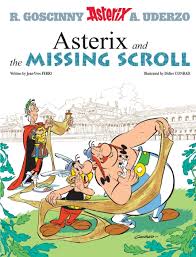Asterix and the Missing Scroll (French: Le Papyrus de César, "Caesar's Papyrus") is the 36th book in the Asterix comics series, and the second written by Jean-Yves Ferri and illustrated by Didier Conrad.[1] A central theme is censorship and the battle over information.[2] The title alludes to Julius Caesar's classic book, Commentarii de Bello Gallico (Commentaries on the Gallic War). The comic adds a fictitious Chapter 24 titled "Defeats at the Hands of the Indomitable Gauls of Armorica".[3]
| Asterix and the Missing Scroll (Le Papyrus de César) | |
|---|---|
 | |
| Date | 2015 |
| Main characters | Asterix and Obelix |
| Series | Asterix |
| Creative team | |
| Writer | Jean-Yves Ferri |
| Artist | Didier Conrad |
| Original publication | |
| Language | French |
| Translation | |
| Date | 22 October 2015 |
| Translator | Anthea Bell |
| Chronology | |
| Preceded by | Asterix and the Picts |
| Followed by | Asterix and the Chariot Race |
Plot
editCaesar has completed writing his Commentaries on the Gallic War, but his publisher, Libellus Blockbustus, encourages him to omit Chapter 24 on "Defeats at the Hands of the Indomitable Gauls of Armorica", fearing it would besmirch the Roman leader's curriculum vitae. A mute black Numidian scribe, Bigdhata, steals a copy of the chapter and gives it to the journalist, the Orwell-esq Confoundtheirpolitix (a parody of Julian Assange), who in turn passes it on to the village of indomitable Gauls.
Chief Vitalstatistix is unfazed by the lie that all Gaul has been conquered by the Romans, but his wife Impedimenta urges him to campaign for the truth. Since the Gauls have, unlike the Greeks and Romans, no skills in reading and writing, the druid Getafix (accompanied by Asterix, Obelix and Dogmatix) travels to the sacred forest of the Carnutes to meet his former teacher, Archaeopterix, who will then pass on the truth by word of mouth to future generations. The true story eventually reaches René Goscinny and Albert Uderzo in a French cafe in modern times, who publish the censored tales in comic books as the Asterix adventures.
Caricatures
editThe official Asterix site notes there are several caricatures of celebrities in the book.[4]
- The newsmonger character Confoundtheirpolitix was inspired by and resembles Julian Assange. Jean-Yves Ferri said the character was almost called Wikilix in reference to WikiLeaks.[5] Like Assange, Confoundtheirpolitix "makes use of the most modern networks to spread the news, and is something of a worry to the powerful in the Known World". The colors of his clothes resemble those of another reporter, Tintin,[6] while the name is a reference to the British national anthem.
- Caesar's publisher Libellus Blockbustus resembles French advertising magnate Jacques Seguela, but Ferri said the character is actually based on presidential advisers Henri Guaino and Patrick Buisson, who both worked for former French president Nicolas Sarkozy.[7]
- Film director Alfred Hitchcock is caricatured as an unnamed falconer among the entourage of Libellus Blockbustus.[8] This is a tribute to Hitchcock as the director of The Birds.[9]
- French actor Jean Réno appears as a soldier in Libellus Blockbustus's special unit tasked to retrieve the scroll.
- French journalist Franz-Olivier Giesbert is caricatured as the white-haired critic of Mundus.
Notes
edit- The whistleblower character Bigdhata is an allusion to Edward Snowden and Chelsea Manning.[10]
- Asterix and the Missing Scroll had an initial print-run of about 4 million copies, half in French and the other half in other languages.[11] It was France's top-selling book of 2015, with more than 1.6 million copies sold.[12]
- This book was the final Asterix book to be translated by long-time translator Anthea Bell, who was forced to retire due to illness in 2016.[13]
- Anachronistix's pipe makes tweeting sounds and is accompanied by small blue birds, in an apparent reference to Twitter.[14]
Reception
editOn Goodreads, Asterix and the Missing Scroll has a score of 3.69 out of 5.[15]
References
edit- ^ "Asterix and the Missing scroll – Asterix – The official website". www.asterix.com. Retrieved 2018-10-03.
- ^ Johnston, Rich (22 October 2015). ""The Best Selling Comic Of 2015 Gets A Title – Asterix And The Missing Scroll"". Bleeding Cool. Retrieved 1 April 2015.
- ^ "Asterix and the Missing Scroll – exclusive preview". The Guardian. ISSN 0261-3077. Retrieved 2018-10-03.
- ^ "The Caricatures in Asterix and the Missing Scroll". Asterix The Official Website. LES ÉDITIONS ALBERT RENÉ. Archived from the original on 2018-01-18. Retrieved 18 January 2018.
- ^ "Asterix to team up with Assange-like character in new comic". France 24. 13 October 2015. Retrieved 24 July 2017.
- ^ "The Caricatures in Asterix and the Missing Scroll". Asterix The Official Website. LES ÉDITIONS ALBERT RENÉ. Archived from the original on 2018-01-18. Retrieved 18 January 2018.
- ^ "Asterix to team up with Assange-like character in new comic". France 24. 13 October 2015. Retrieved 24 July 2017.
- ^ Laurent, Patrick (21 October 2015). "Astérix à la conquête du monde avec un 36ème album". DH.be. Retrieved 18 January 2018.
- ^ "The Caricatures in Asterix and the Missing Scroll". Asterix The Official Website. LES ÉDITIONS ALBERT RENÉ. Archived from the original on 2018-01-18. Retrieved 18 January 2018.
- ^ Hollow, Christopher (10 May 2016). "These Romans are crazy! The 7 best Asterix books you need to read". SBS. Retrieved 24 July 2017.
- ^ "Julian Assange inspires new character in "Asterix and the Missing Scroll"". Euronews. 14 October 2015. Retrieved 15 October 2015.
- ^ "Cahiers d'Esther, Carnets de Cerise, Papyrus de César... Le box-office BD". Le Figaro. 9 March 2016.
- ^ Kamm, Oliver (23 December 2017). "Asterix is the magic potion that made me a linguist". The Times. Retrieved 4 January 2018. (subscription required)
- ^ Deb, Rwitoban (1 November 2015). "Missing, the magic potion of old in Asterix and the Missing Scroll". The Telegraph. Retrieved 14 May 2020.
- ^ "Asterix and the Missing Scroll". www.goodreads.com. Retrieved 2018-10-03.